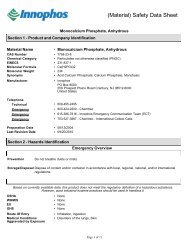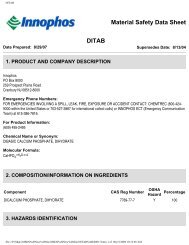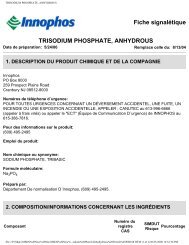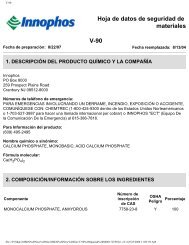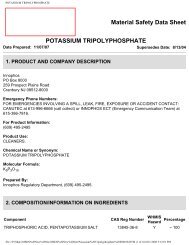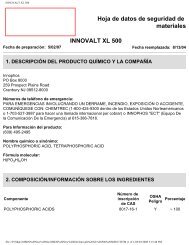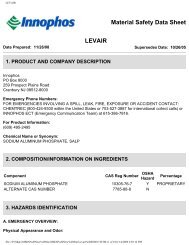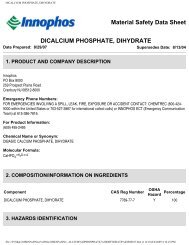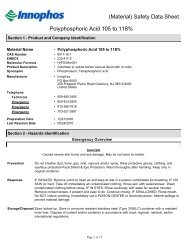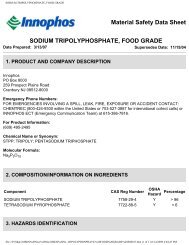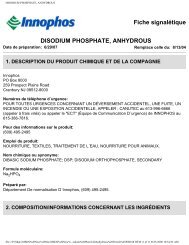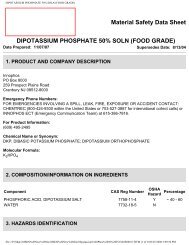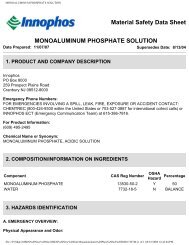DIAMMONIUM PHOSPHATE GRANULAR FOOD GRADE - Innophos
DIAMMONIUM PHOSPHATE GRANULAR FOOD GRADE - Innophos
DIAMMONIUM PHOSPHATE GRANULAR FOOD GRADE - Innophos
- No tags were found...
Create successful ePaper yourself
Turn your PDF publications into a flip-book with our unique Google optimized e-Paper software.
<strong>DIAMMONIUM</strong> <strong>PHOSPHATE</strong> <strong>GRANULAR</strong> <strong>FOOD</strong> <strong>GRADE</strong>prevent aspiration of swallowed product, lay victim on side with head lower than waist. Vomiting mayoccur spontaneously. If vomiting occurs and the victim is conscious, give water to further dilute thechemical. Also see Note To Physician.MEDICAL CONDITIONS POSSIBLY AGGRAVATED BY EXPOSURE:Inhalation of product may aggravate existing chronic respiratory problems such as asthma,emphysema or bronchitis. Skin contact may aggravate existing skin disease.NOTES TO PHYSICIAN:All treatments should be based on observed signs and symptoms of distress in the patient.Consideration should be given to the possibility that overexposure to materials other than this productmay have occurred.Ingestion of large quantities of phosphate salts (over 1.0 grams for an adult) may cause an osmoticcatharsis resulting in diarrhea and probable abdominal cramps. Larger doses such as 4-8 grams willalmost certainly cause these effects in everyone. In healthy individuals most of the ingested salt will beexcreted in the feces with the diarrhea and, thus, not cause any systemic toxicity. Doses greater than10 grams hypothetically may cause systemic toxicity. Treatment should take into consideration bothanionic and cation portion of the molecule. The following treatments should be considered for thespecific group(s) of phosphate salts found in this product:--All phosphate salts, except calcium salts, have a hypothetical risk of hypocalcemia, so calcium levelsshould be monitored.--Ammonium salts have a hypothetical risk of ammonia toxicity. In addition to calcium levels, ammoniaand phosphate levels should be monitored.--Potassium salts have a hypothetical risk of hyperkalemia which can cause cardiac arrhythmia. Inaddition to calcium levels, potassium and phosphate levels should be monitored. Also considercontinuous EKG monitoring to detect hyperkalemia.--Sodium salts have a hypothetical risk of hypernatremia. In addition to calcium levels, sodium andphosphate levels should be monitored.5. FIRE FIGHTING MEASURESFIRE HAZARD DATA:Flash Point:Not ApplicableExtinguishing Media:Not combustible. Use extinguishing method suitable for surrounding fire.Special Fire Fighting Procedures:file:///P|/Share/MSDS%20New%20Site/MSDS%20New.../Diammonium%20Phos%20Gran%20Food%20E00017.HTM (3 of 11)9/23/2008 10:46:04 AM



